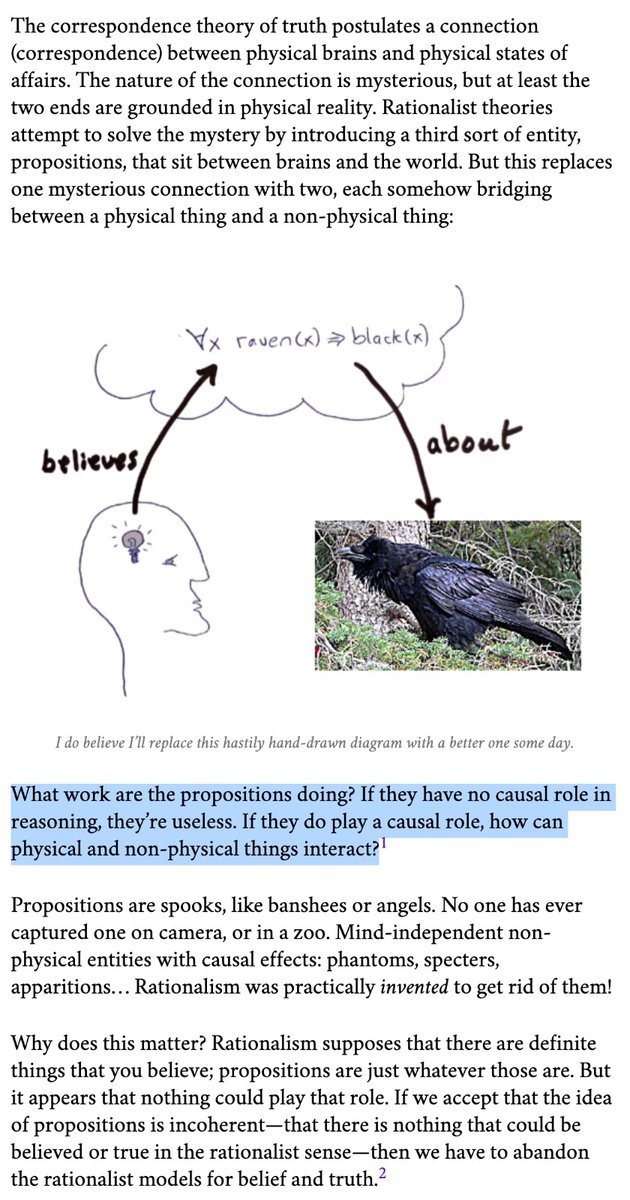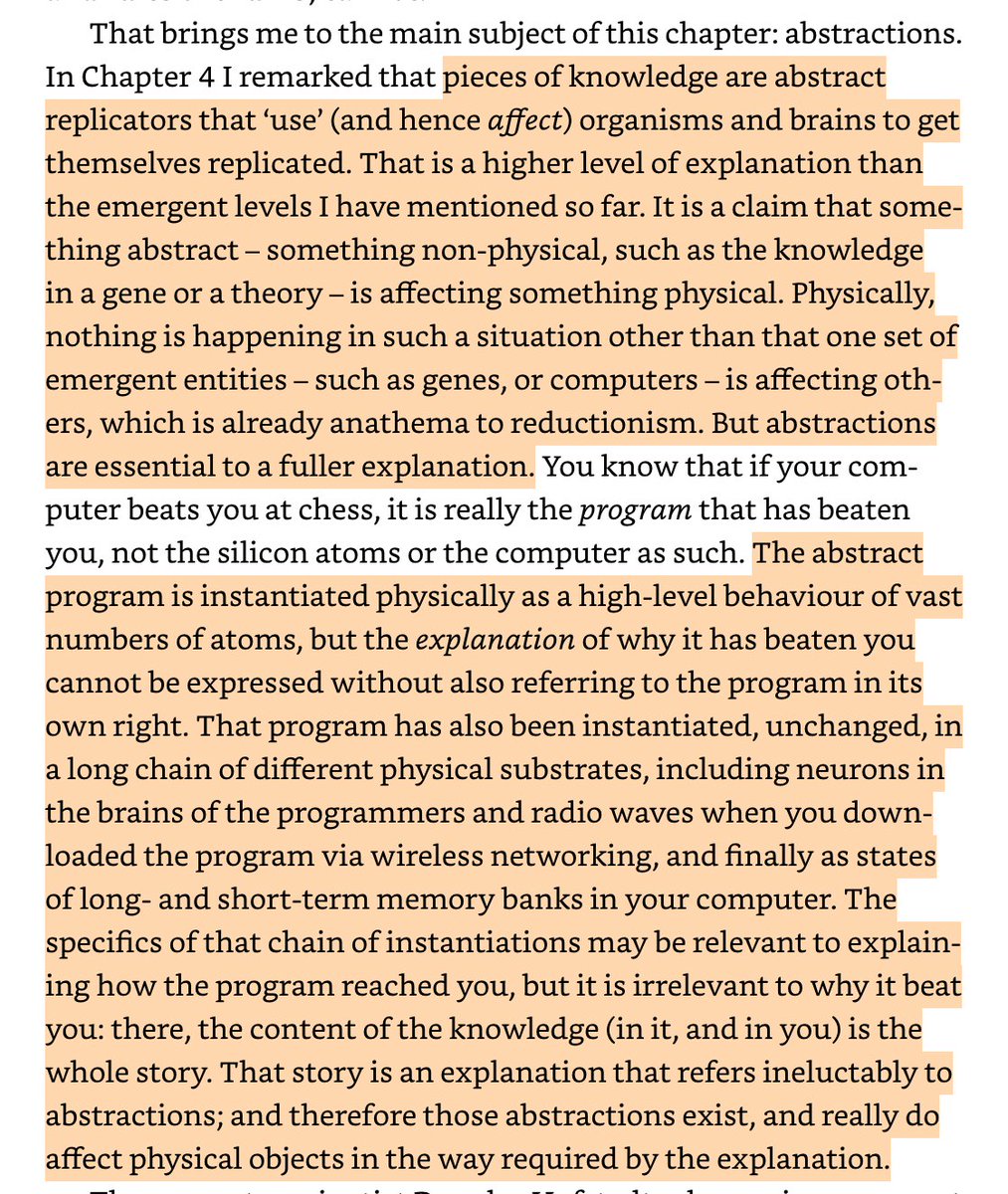(for the very small niche of people that find this interesting)
For starters, where they agree:
- We are fallible. We can never have final, definite, certain knowledge.
- Optimism is warranted; progress is possible.
- Science often works. Understanding how and why science works is good and important.
- Knowledge isn& #39;t "justified true belief."
- We are fallible. We can never have final, definite, certain knowledge.
- Optimism is warranted; progress is possible.
- Science often works. Understanding how and why science works is good and important.
- Knowledge isn& #39;t "justified true belief."
One reason these two views bounce off of each other is that they both critique other kinds of rationalism, specifically Bayesianism.
Bayesians claim that we can quantify uncertainty probabilistically, and thereby regain a kind of meta-certainty. Both Davids reject this claim.
Bayesians claim that we can quantify uncertainty probabilistically, and thereby regain a kind of meta-certainty. Both Davids reject this claim.
However, the core of the CR critique is that probability is subjective. Our credence has no bearing on the truth or falsity of an explanation, which is objective.
The core of the meta-rational critique is that ontology is nebulous, so rationalisms in general can& #39;t work.
The core of the meta-rational critique is that ontology is nebulous, so rationalisms in general can& #39;t work.
Upon hearing the meta-rational critique, CR people tend to port it back into a claim about *epistemological fallibilism.*
"Yes, we know the ontology of our explanations isn& #39;t correct. But there is some particular way the world is, and we can approximate it better and better."
"Yes, we know the ontology of our explanations isn& #39;t correct. But there is some particular way the world is, and we can approximate it better and better."
But the meta-rational view says something different: not only could we be wrong about ontology (fallibilism) but there can be no single, definite, correct answer (nebulosity).
This is not the same thing as relativism (ontology is arbitrary).
Many misunderstandings emerge here.
This is not the same thing as relativism (ontology is arbitrary).
Many misunderstandings emerge here.
Despite differences from other rationalisms, CR retains a reliance on the Correspondence Theory of Truth
On this view, roughly, truth (of propositions) is correspondence to the facts (in the world)
Crucially: propositions must be able to be objectively, definitely true or false
On this view, roughly, truth (of propositions) is correspondence to the facts (in the world)
Crucially: propositions must be able to be objectively, definitely true or false
Deutsch acknowledges that our statements (mental or linguistic things) cannot have this property: https://twitter.com/DavidDeutschOxf/status/981222503061311490?s=20">https://twitter.com/DavidDeut...
So his version of correspondence theory is that:
- we make statements
- these statements are conjectural approximations of abstract propositions
- those propositions are objectively true or false of the world https://twitter.com/DavidDeutschOxf/status/981209924763029509?s=20">https://twitter.com/DavidDeut...
- we make statements
- these statements are conjectural approximations of abstract propositions
- those propositions are objectively true or false of the world https://twitter.com/DavidDeutschOxf/status/981209924763029509?s=20">https://twitter.com/DavidDeut...
Chapman points out (below) that we don& #39;t know how propositions (an abstract, non-physical thing) can affect brains or the world (physical things).
Deutsch& #39;s "criterion for reality" is that what& #39;s real is just that which features in our best explanations, and because abstract propositions feature in our best explanation of epistemology, there is nothing problematic about invoking them.
Chapman would say:
- No, they don& #39;t feature in our best explanation: we can explain why rationality works without invoking them
- Furthermore, rationality can& #39;t work unaided (so it& #39;s not complete as an explanation)
"Rationality" here means ontologically definite methods
- No, they don& #39;t feature in our best explanation: we can explain why rationality works without invoking them
- Furthermore, rationality can& #39;t work unaided (so it& #39;s not complete as an explanation)
"Rationality" here means ontologically definite methods
Further, I think Chapman wld say:
If abstract propositions only have causal power through their physical instantiations, and those physical instantiations are necessarily indefinite, AND THEY WORK...
...then a causal account of *why they work* can& #39;t invoke definite propositions
If abstract propositions only have causal power through their physical instantiations, and those physical instantiations are necessarily indefinite, AND THEY WORK...
...then a causal account of *why they work* can& #39;t invoke definite propositions
There& #39;s more to say about the focus on problems in CR and the problems with representationalism in the meta-rational view but will leave this for now.
CC: @ReachChristofer @ToKTeacher @reasonisfun @manylooseends @krlwlzn @Podge_G @DorfGinger etc.
CC: @ReachChristofer @ToKTeacher @reasonisfun @manylooseends @krlwlzn @Podge_G @DorfGinger etc.

 Read on Twitter
Read on Twitter



